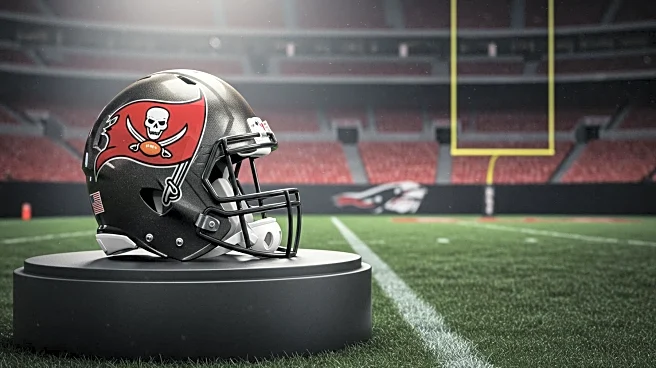What's Happening?
Shilo Sanders, an undrafted rookie safety for the Tampa Bay Buccaneers, may have jeopardized his chances of securing a roster spot following an incident during the team's preseason finale against the Buffalo Bills. Sanders was ejected from the game after punching Bills tight end Zach Davidson in front of a referee. This action has raised doubts about his future with the team, as the Buccaneers are set to reduce their roster from 90 to 53 players. Sanders, who had four tackles in the preseason, is currently listed as a third-string safety on the team's unofficial depth chart. His history of anger control issues, including a previous altercation with Oregon Ducks coaches and players, further complicates his prospects.
Why It's Important?
The incident involving Shilo Sanders is significant as it highlights the challenges faced by undrafted players trying to secure a position in the NFL. Sanders' actions not only affect his personal career but also reflect on the team's decision-making process regarding player conduct and discipline. The Buccaneers must weigh the potential talent Sanders brings against the risk of disruptive behavior. This situation underscores the importance of maintaining professionalism and composure in high-stakes environments, which can impact team dynamics and overall performance.
What's Next?
The Buccaneers are expected to make their final roster decisions by Tuesday at 4:00 p.m. ET, which will determine Sanders' fate with the team. If released, Sanders may have the opportunity to join the practice squad or seek opportunities with other teams. The decision will likely consider his past behavior and the team's need for reliable and disciplined players. The outcome could influence Sanders' approach to his career and prompt him to address his anger management issues to improve his prospects in professional football.
Beyond the Headlines
The broader implications of Sanders' situation may involve discussions around player conduct and the support systems available to athletes dealing with behavioral challenges. Teams may need to invest in resources that help players manage stress and emotions effectively, ensuring a positive environment both on and off the field. This incident could also lead to increased scrutiny of how teams handle disciplinary actions and the criteria used to evaluate player potential versus behavioral risks.









